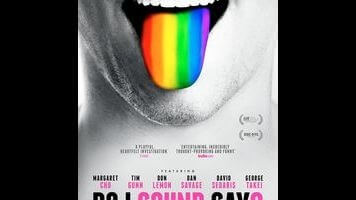David Thorpe doesn’t like the way he sounds. Fresh out of a long-term relationship and quickly approaching midlife, this doubt-plagued gay Manhattanite thinks most of his problems stem from his voice. His self-consciousness is all consuming, and he decides to deal with it by making a movie (his first) about his personal struggles, as well as about larger issues of representation within the queer community.
It’s a serious topic, but the resulting documentary isn’t an especially severe sit. Do I Sound Gay? is a briskly entertaining 77 minutes, and frequently as mouthy as its title. Thorpe even recites the opening credits in the “nasally” voice that he’s had since coming out in college and which he desperately wants to change by any means necessary.
Is he making much ado out of nothing, though? The early scenes take a micro view, as Thorpe discusses his anxieties with his best friends (most of whom can’t believe he wants to change something so essential about himself) and visits a speech therapist who uses terms like “upspeak” while trying to help her client “code-switch volitionally.” It seems, for a horrible moment, that this is just going to be a straightforward and solipsistic self-help narrative. But Thorpe quickly widens his view to tackle the role of the voice in the gay community at large, and how it’s often used to pigeonhole people.
Thorpe talks with a number of subjects: Humorist David Sedaris (whose work seems to be a key influence on the brassy tone the filmmaker strikes here) discusses all the times he’s been mistaken for a woman on the phone. Columnist and activist Dan Savage talks about how queer self-consciousness over things like voice and mannerism often results from the persecution gay people experience in their youth. In one of the most moving scenes, Thorpe visits with Zach King, an Ohio teenager and self-proclaimed “diva,” whose beating by homophobic students was captured on a video that caused an internet uproar. In the middle of the interview, King’s mother shoos Zach out of the room so she can confess to Thorpe about the pain she instinctually knows her son is hiding beneath his unflappably loud-and-proud exterior.
Any time the film threatens to get too dark, Thorpe lightens the mood with a healthy dose of self-deprecation. This is a mostly appropriate tack, though there are points—like a too-brief montage exploring the history of the “dandy” in cinema—where a little more sobering insight would have been appreciated. It’s also easy to imagine Do I Sound Gay? working better as a personal essay (again in the Sedaris vein) since Thorpe’s filmmaking is often awkward, especially during the interview segments in which he’ll randomly cut to a reaction shot of himself while his subject is in the middle of speaking. Regardless, his journey toward a more confident sense of self, and what his struggle says about the wider community he’s a part of, is overall engrossing and inspiring.































![Rob Reiner's son booked for murder amid homicide investigation [Updated]](https://img.pastemagazine.com/wp-content/avuploads/2025/12/15131025/MixCollage-15-Dec-2025-01-10-PM-9121.jpg)









